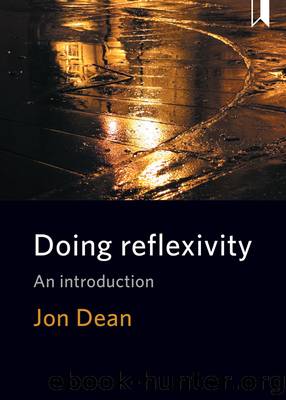Doing Reflexivity by Dean Jon

Author:Dean, Jon [Dean, Jon]
Language: eng
Format: epub
ISBN: 9781447330875
Google: 8EcotAEACAAJ
Publisher: Policy Press
Published: 2017-01-15T03:32:12+00:00
He also writes of expecting students âwith insider or family knowledge of the place and previous experience at elite institutionsâ to be the most successful at the school (Khan, 2011: 51). In fact these students â from historic families such as Rockefeller and Vanderbilt â are somewhat sidelined at St. Paulâs, shunted to their own dormitory, because the main student body, from the new elite, see them as representing an undeserving class of inheritors, rather than a deserving hard-working one.
Khanâs personal politics and personal experiences are at the fore here. He notes how he finds âtoo much inequality both immoral and inefficientâ (Khan, 2011: 4), and writes of how he was discombobulated as a teenager, unready for the world of a prestigious boarding school, and how fellow minority students, from poorer neighbourhoods than he, fared worse. Here, Khan is doing what all researchers do, thinking about what he might possibly encounter, the research issues that might arise, the questions he will need to ask. There is only so much that can prepare a researcher for the field, and that preparation has to be built on what the researcher can reasonably know. Personal experience, anecdotes and tales, feelings and ideas, are the only things to go on if no previous research exists on a specific locale. This shapes the research process, and these initial steps can be entirely unique to the researcher.
Khan is central to the narrative of Privilege, the pivot around which the data emerges. There are occasions where he has to move the story along using provocation as a research method (Pangrazio, 2016), not just through the researcherâs traditional method of asking questions, but in purposefully acting out of turn to see how participants, in this case young students, react. Khan tells the story of sitting on a sofa situated in the school Common Room that was usually the preserve of final-year students. The sofa was seen as a signifier of prestige and respect at the school, something that younger students would aim for as a goal to attain, indicating they had worked hard to make it through the tough academic environs of the school (Khan, 2011: 48). Khan and a colleague felt that such âconsecrated hierarchiesâ were a problem at St. Paulâs, and so decided intentionally to break the hierarchies and sit on the couch, inviting a younger student to do as well. The young student is made to feel uncomfortable in this instance, and Khan reflects that âwhat we had asked him to do was unfairâ (Khan, 2011: 43). I read this story as one of Khan making data happen, intentionally stirring things up to generate action, pushing his research participants to see how they react, beyond the usual manner of asking awkward questions in interviews. Is this ethical? Khan reports that the young student who was forced to sit down âlooked terrified in his sunken postureâ. A researcher should feel deep unease at causing research participants to be âuncomfortableâ and âlook terrifiedâ, especially if they are 14 years old.
Download
This site does not store any files on its server. We only index and link to content provided by other sites. Please contact the content providers to delete copyright contents if any and email us, we'll remove relevant links or contents immediately.
Chaco's Northern Prodigies : Salmon, Aztec, and the Ascendancy of the Middle San Juan Region after AD 1100 by Paul F. Reed(376)
Digital International Relations by Unknown(371)
Law Enforcement Interpersonal Communication and Conflict Management by Brian Douglas Fitch(365)
Skilled interpersonal communication: Research, theory and practice, Fifth edition by Owen Hargie(355)
The Enduring Color Line in U.S. Athletics by Krystal Beamon Chris M. Messer(351)
Critical Perspectives on Human Security : Rethinking Emancipation and Power in International Relations by David Chandler; Nik Hynek(340)
EPSO CAST Political affairs EU policies: How to succeed in the selection procedure by Franco Reverte José María(325)
Evidence-Based Policy Making in Labor Economics by Hamermesh Daniel S.;Nottmeyer Olga K.;Nottmeyer Olga;King Sarah;King Sarah;King Sarah;(317)
Writing Public Policy - A Practical Guide to Communicating in the Policy Making Process by Catherine F. Smith(297)
Criminological Theory in Context by John Martyn Chamberlain(292)
Rothschild and Early Jewish Colonization in Palestine (Geographical Perspectives on the Human Past) by Ran Aaronsohn(290)
Positive Psychology and Spirituality in Counselling and Psychotherapy (Conflict, Ethics, and Spirituality, 12) by unknow(285)
Tibeton Yoga Its Secret Doc by Evans-Wentz(282)
Threshold Concepts in Women's and Gender Studies by Christie Launius Holly Hassel(278)
Social Problems, Social Issues, Social Science by James Wright(274)
Play in child development and psychotherapy: toward empirically supported practice by Sandra W. Russ(272)
Cognitive Development in Infancy and Childhood (Elements in Child Development) by Mary Gauvain(272)
Latin American Politics and Society by Gerardo L. Munck & Juan Pablo Luna(251)
What Makes a Social Crisis?: The Societalization of Social Problems by Jeffrey C. Alexander(232)
